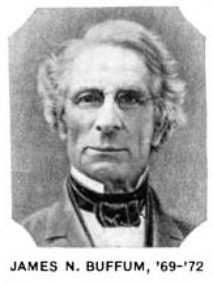James N. Buffum facts for kids
Quick facts for kids
James Needham Buffum
|
|
|---|---|
 |
|
| 14th Mayor of Lynn, Massachusetts | |
| In office January 1, 1872 – January 6, 1873 |
|
| Preceded by | Edwin Walden |
| Succeeded by | Jacob M. Lewis |
| 12th Mayor of Lynn, Massachusetts | |
| In office January 4, 1869 – January 3, 1870 |
|
| Preceded by | Roland G. Usher |
| Succeeded by | Edwin Walden |
| Member of the Massachusetts House of Representatives | |
| In office 1873–1873 |
|
| Personal details | |
| Born | May 16, 1807 North Berwick, Maine |
| Died | June 12, 1887 (aged 80) Lynn, Massachusetts |
| Signature | |
James Needham Buffum (born May 16, 1807 – died June 12, 1887) was an important politician from Massachusetts. He is best known for serving as the Mayor of Lynn, Massachusetts, two different times. He was also a strong supporter of ending slavery.
Early Life and Beginnings
James Buffum was born on May 16, 1807, in North Berwick, Maine. His parents were Samuel and Hannah (Varney) Buffum.
A Public Servant
James Buffum served his community in several ways. He was the Mayor of Lynn, Massachusetts, from 1869 to 1870. He then served again from 1872 to 1873. Being a mayor means he was the main leader of the city. He also worked in the Massachusetts House of Representatives, which is part of the state government. In 1868, he was chosen as a presidential elector. This means he helped formally elect the President of the United States.
Fighting for Freedom
One of the most important things James Buffum did was fight against slavery. He was an abolitionist, which means he believed slavery was wrong and wanted it to end.
He was a brave friend to Frederick Douglass, a famous leader who had escaped slavery. Once, when Douglass was on a train, some people tried to force him out of a special car because of his race. James Buffum stood with Douglass and helped him resist the angry crowd.
In 1845, Buffum traveled all the way to Scotland with Frederick Douglass. They went there to protest against a church called the Free Church of Scotland. This church had accepted money that came from American slaveholders. Buffum and Douglass believed it was wrong for the church to keep money that came from such an unfair system. Their protest helped raise awareness about the evils of slavery around the world.
Later Years and Legacy
James Buffum passed away on June 12, 1887. He was buried at Pine Grove Cemetery (Lynn, Massachusetts) in Lynn. His life showed a strong commitment to public service and fighting for what he believed was right, especially the freedom of all people.
 | Stephanie Wilson |
 | Charles Bolden |
 | Ronald McNair |
 | Frederick D. Gregory |

